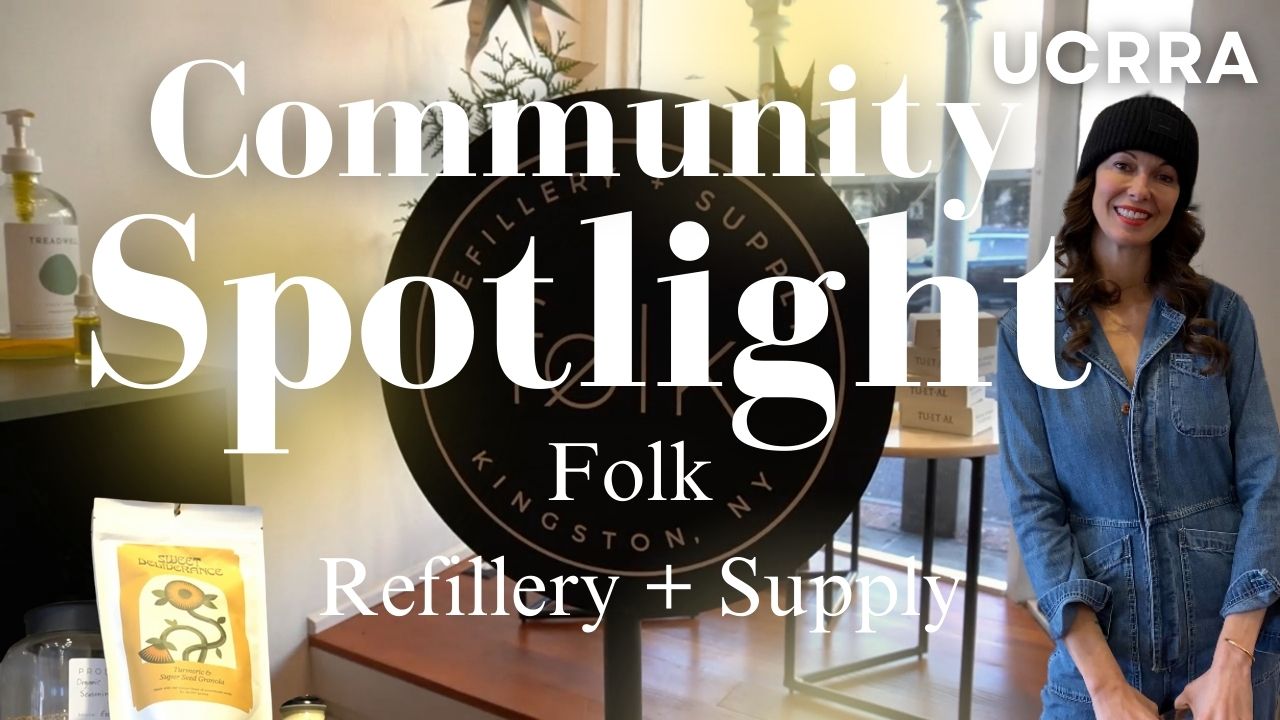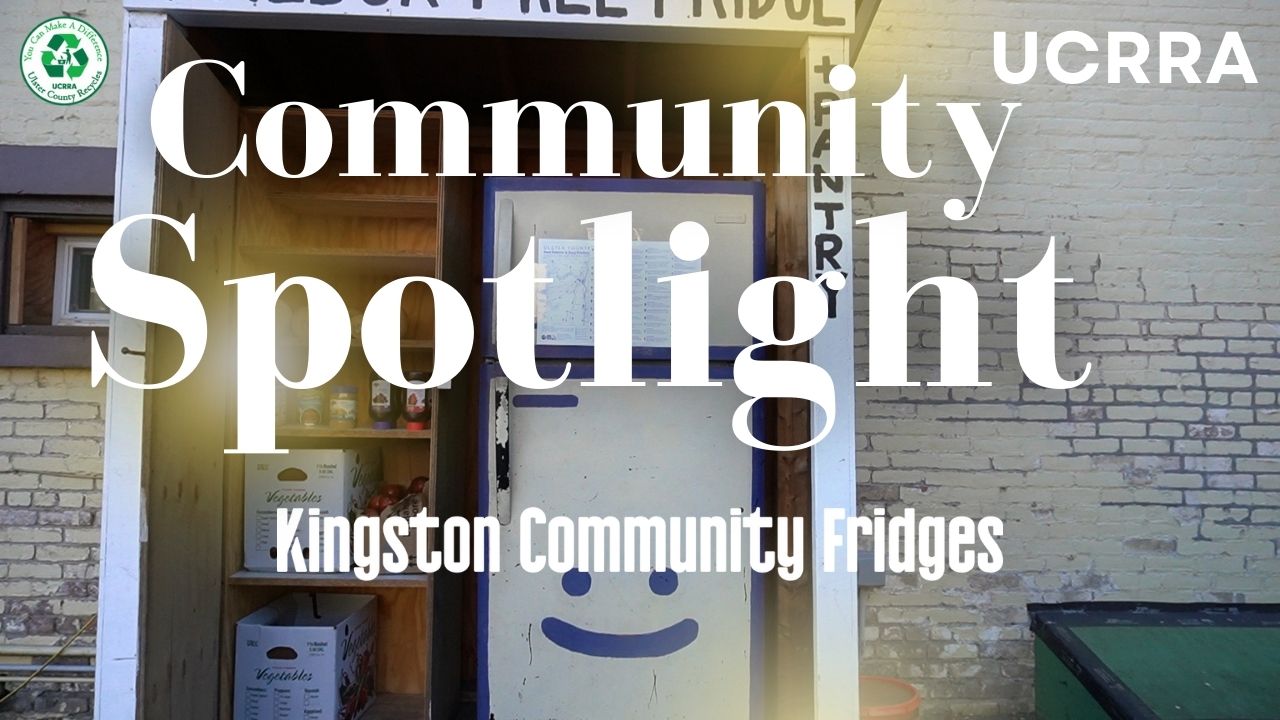The Recycling Outreach Team’s “Community Spotlight” initiative highlights local stories about waste-sustainability. This month, Tanesia sat down with the owners of Black Cat Bulk Goods to learn why buying in bulk promotes circularity, supports local businesses, and fights climate change through value based systems that support waste reduction! If you enjoy this blog, or know someone who might, please consider sharing this story!
May 20th, 2023
Community Spotlight Blog by Tanesia White, Recycling Educator
Interviewees: Jill Pucciarelli & Jim Switzer, Black Cat Bulk Goods (BCBG)
Jill has a degree in Visual and Critical studies from the School of Visual Arts. Jill paints, draws and sews all the signs for Black Cat Bulk Goods herself, as well as doing all the graphic design and website building. Ten years ago, Jill moved to Olympia, WA to work at an independent record label called K, where she learned a lot about keeping things small, local and environmentally-conscious. The massive bulk section at the Olympia Food Co-op and a wonderful store called Radiance were two things Jill really missed when she moved back to New York in 2017. Those places and Jill’s experience there inspired the creation of Black Cat Bulk Goods. After several years of working at restaurants in the Hudson Valley, Jill wanted a change and more stability. She decided to bring some of the things she loved but couldn’t find here to the local community.
Jim has degrees in Liberal Studies and Sustainability from Oregon State University. He’s been in the hospitality industry for over 30 years working in restaurants, retail, and customer service. For the same amount of time, Jim has been conscious of the environment and our role, as people, in its health. As Jim’s responsibility in the hospitality industry increased to management, he was able to implement recycling, compost, and waste reduction programs. Then, during the COVID emergency Jim saw that waste reduction, plastic bag bans, and bulk product offerings were almost completely erased and single-use packaging, disposable utensils, and food packaging increased. Public waste receptacles were overflowing with takeout garbage. It seems like people have forgotten that single use products are not a necessary problem. Jim has been buying organic and responsible food and household products – in bulk where possible – since the 1990s and it’s the best way he can think of providing something useful to the community in the most conscientious way.

What is a bulk/refillery store for those who may not know?
Our shop is intended to be a neighborhood general store with an environmentalist agenda. We sell organic pantry staples, gardens seeds, books and zines, and practical household items that are made with eco-friendly ingredients/materials and are sold package-free. Traditional packaging (even paper boxes) is almost always single-use, which wastes resources to produce and dispose of. We also offer people the opportunity to refill their empty, pre-existing containers with products like soap and shampoo as an alternative to purchasing a new plastic bottle each time they run out.
Why did you decide to open Black Cat Bulk Goods?
During the pandemic, we were dismayed to see the progress our community had been making being erased. Grocery stores removed their bulk food bins, shoppers were told they couldn’t use canvas bags, Ulster County suspended its plastic bag ban and the amount of take-out containers our employers went through was ridiculous. We wanted to offer an alternative to the new status quo, and make it easier to find the things we were seeking out in local shops but couldn’t find.
What products/services does Black Cat Bulk Goods offer?
We sell alternatives to common household items like refillable safety razors, plastic-free toilet paper, cotton dish cloths, and bamboo toothbrushes, as well as books and zines focused on gardening, vegan cooking, and living a do-it-yourself life. We have handmade soap bars from local makers; cosmetics made with wild-foraged botanicals; organic flours, beans, and grains from Wild Hive Farm; Sfoglini pasta; nuts, seeds, trail mix and a lot more. We make our own non-dairy milks, as well as mixes for things like vegan mac and cheese, cake, cookies, and gluten-free pancakes. On our website (www.blackcatbulkgoods.com), we offer local pick-up with a contact-free option.

What waste reduction strategies do you practice within the store?
When we opened this store, we specifically sought out a pre-existing space; the building we rent from dates to the late 1800s and we didn’t make any renovations or changes, avoiding embodied energy and construction waste.
The bulk home goods we carry, like liquid soap and powdered laundry products, come to us in larger containers that we send back to their makers to be reused and refilled as part of a completely closed loop system. When we order things online, we aim to buy from like-minded vendors who will use paper/compostable packing materials and won’t fill our boxes with plastic.
We use local food distributors, one of whom is based nearby and picks up products directly from the farms that grow and produce them. There isn’t trash collection at our building, and we don’t sell produce (which would otherwise be a huge source of waste) because we want to encourage people to buy directly from the multitude of farmers’ markets, farm stands and CSAs in the area.
What is the most important thing to you when it comes to the type of products being sold within the store? Why is this a priority?
Origin. Our beans, pasta, sauces, flours, grains, maple syrup and sunflower oil all come from New York. Nearly everything we stock is organic, and we prioritize local products whenever we can. We also care about the labor and ethics of the companies behind the other products we sell. To quote Amanda Lee McCarty from the podcast Clotheshorse, “It’s not sustainable if the people who made it aren’t being paid a living wage”. Labeling products as “eco-friendly” has become a major cash grab; companies big and small rebrand things from places unknown. We purchase the majority of the things we sell directly from their makers, who are based in the USA. Traceability and transparency are very important to us, and we chose only to support other small businesses that share our values.

What is one thing you wish people knew about buying in bulk?
Buying in bulk can feel like using a community resource, but when that resource is privately funded by only one or two people, instead of a buyers’ club, cooperative or large corporation, it really needs your support to survive. Every little bit counts; even if you only replaced one item you were planning to buy with something sold in bulk, it would make a difference. Every plastic package avoided is a win. Word of mouth makes a huge difference in both the fight against climate change and the success of small businesses.
What advice do you have for others looking to open a bulk goods and refillery store?
Don’t compromise your values. Research each product thoroughly before ordering it; find out where it came from and who made it. Just because something is bamboo doesn’t mean it’s sustainable. Ask yourself, is that really something someone needs or can a jar do the same thing? There are so many overly specialized and greenwashed products; you have to be intentional with all your decisions if you want to open a store that genuinely fights waste, exploitation, and overconsumption.
What new and exciting projects do you have planned for the future?
In the coming months, we plan on expanding our offerings of house-made products. We will be making more vegan essentials like dairy-free butter, cream cheese, oat milk and coffee creamer. All of these items will be in glass containers that can be returned to our store for a refundable deposit. We aim to reuse rather than recycle as much as possible. As an avid canner, I also plan on making pickles and preserves with organic produce from our own garden as well as local farms. Additionally, we are working towards setting up an apothecary with bulk, medicinal herbs.


